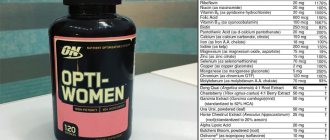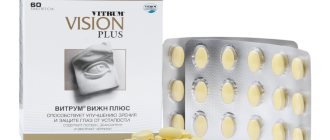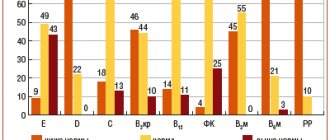Ascorutin belongs to the group of vitamin-containing drugs. The medicine is widely used for various diseases accompanied by decreased immunity, fragility of blood vessels and capillaries, allergies, lack of vitamins C and P, and other conditions. Instructions for use of Ascorutin include indications such as prevention of hypovitaminosis P and C, vascular pathologies, elimination of flu symptoms and others. The product is available in the form of tablets, each of which contains 50 mg of rutin and ascorbic acid.
Description of the drug
The composition of the drug Ascorutin includes such active components as rutin and ascorbic acid. Rutin is a natural bioflavonoid that has the ability to reduce permeability, capillary fragility, reduce excessive blood clotting, increase the body's immune defense, and protect against viruses and bacteria. In turn, vitamin C has a positive effect on bone and muscle tissue, has a beneficial effect on the condition of blood vessels, removes toxins from the body, and promotes the production of collagen and connective tissues.
The combination of these two components enhances their mutual effect, which makes it possible to use Ascorutin to strengthen the walls of blood vessels, increase immunity, reduce the distensibility of capillaries and veins, strengthen general well-being, and prevent influenza and colds.
The product is available in tablets with a yellowish-greenish tint. This color is explained by the natural color of ascorbic acid and bioflavonoid.
Ascorutin tablets, 50 pcs. — Kyiv Vitamin Plant
Absorption of the drug is reduced when used simultaneously with acetylsalicylic acid, oral contraceptives, and when drinking alkaline drinks, fresh fruit or vegetable juices. Ascorbic acid in a dose of ≥ 1 g increases the bioavailability of oral contraceptives (estrogens, including ethinyl estradiol), increases the concentration of salicylates in the blood, increasing their side effects (risk of crystalluria, effect on the gastric mucosa).
Acetylsalicylic acid, barbiturates, tetracyclines: increased excretion of ascorbic acid in the urine.
Penicillin (including benzylpenicillin), tetracycline, iron supplements: high doses of ascorbic acid can increase their absorption and concentration in the blood.
Deferoxamine: with the simultaneous use of vitamin C and deferoxamine, iron absorption and excretion in the urine increases; tissue toxicity of iron increases, especially cardiotoxicity, which can lead to decompensation of the circulatory system. Cardiac dysfunction (usually reversible after discontinuation of vitamin C) has been reported in patients with idiopathic hemochromatosis and thalassemia treated with deferoxamine and high doses of ascorbic acid (more than 500 mg per day). This combination in this category of patients requires caution and careful monitoring of cardiac function. Ascorbic acid can be used only 2 hours after the injection of deferoxamine.
Heparin, indirect anticoagulants, phenothiazines, fluphenazine, sulfonamide drugs, aminoglycoside antibiotics: decreased effectiveness of these drugs.
Cyclosporine A: its bioavailability may be reduced.
When used simultaneously with B vitamins, a mutual enhancement of the therapeutic effect is observed. High doses of ascorbic acid affect the resorption of vitamin B12.
When using high doses of ascorbic acid, the half-life of corticosteroids and paracetamol increases (this interaction does not have clinical consequences when using therapeutic doses).
Calcitonin: increases the rate of absorption of ascorbic acid.
The use of high doses of ascorbic acid increases the renal excretion of amphetamine.
Aluminum antacids: it should be taken into account that ascorbic acid promotes the absorption of aluminum from the intestine; it is possible to increase the elimination of aluminum in urine.
The combined use of antacids and ascorbic acid is not recommended, especially for patients with renal failure.
With long-term use (over 4 weeks), the drug should not be prescribed simultaneously with cardiac glycosides, antihypertensive drugs or non-steroidal anti-inflammatory drugs, as it may enhance their effect.
Ascorbic acid increases the excretion of oxalate in the urine, thereby increasing the risk of oxalate stones forming in the urine.
The combined use of very high doses of ascorbic acid with amygdalin (complementary medicine) may increase the risk of cyanide toxicity.
Smoking, alcohol: reduce the concentration of ascorbate in the blood plasma.
Disulfiram: Long-term use of large doses of ascorbic acid inhibits the disulfiram-alcohol reaction.
Ascorbic acid in large doses (over 2 g/day) can affect the results of biochemical determinations of the levels of creatinine, uric acid and glucose in blood and urine samples, and the determination of the level of inorganic phosphates, liver enzymes and bilirubin in the blood. A stool occult blood screening test may be falsely negative.
Pharmacological effect
What are the benefits of Ascorutin? A combined vitamin-containing product helps solve many problems with various diseases. Ascorutin is prescribed to enhance redox processes, to establish carbohydrate metabolism, and the synthesis of natural steroid hormones. The drug also takes an active part in the restoration and synthesis of connective tissue in the body. In addition, the medicine weakens the effects of radiation, promotes the elimination of waste and toxins, which is important during the recovery period from influenza, acute respiratory viral infections and other diseases. Indications for the use of the drug Ascorutin include conditions in patients with acute venous insufficiency, accompanied by pain, swelling, and vascular inflammation.
Important! It has been clinically proven that in oncology, the drug helps patients restore the vitamin balance of the body and alleviate the general condition.
What childhood diseases are treated with ascorutin?
Ascorutin is very effective in fighting infections. The poor condition of the vascular system greatly aggravates the course of diseases such as influenza, scarlet fever, tonsillitis and measles. The drug serves to strengthen the walls of blood vessels, eliminates their fragility, and improves permeability. It relieves skin rashes that often accompany infectious diseases.
With the help of ascorutin, it is possible to prevent and alleviate the course of childhood chronic glomerulonephritis. These diseases are expressed in the impact of infection on the kidneys, further tissue inflammation, swelling and loss of organ functionality. Glomerulonephritis is accompanied by accelerated loss of proteins, which entails weakening of the child’s body. Ascorutin takes an active part in returning the renal tubules and glomeruli to their functionality. During the treatment of glomerulonephritis in children over 3 years of age, the drug is often included in a complex of health procedures.
Ascorutin helps to effectively treat children suffering from hemorrhagic diathesis
Increased bleeding can be caused by capillary toxicosis (Henoch-Schönlein disease). Children aged 5–10 years are often susceptible to this disease. The pathology develops in the process of joining an allergic reaction to the vascular tissues to the infection. Due to excessive capillary permeability, the skin becomes covered with a characteristic rash. Hemorrhagic diathesis is also expressed by thrombocytopenic purpura (Werlhof's disease), in which blood clotting is impaired as a result of platelet deficiency. Ascorutin, which is involved in the complex treatment of hemorrhagic diathesis, strengthens blood vessels and reduces the activity of the enzyme hyaluronidase, which destroys intercellular tissue.
Ascorutin is used to treat nosebleeds in children.
Scope of use of the medicine
What are the indications for the use of Ascorutin? The drug is prescribed to patients for the following purposes:
- restoration of the integrity of capillaries damaged during treatment with salicylates and anticoagulants;
- elimination of residual symptoms of influenza and acute respiratory viral infections;
- prevention of colds and viral diseases;
- treatment of diseases associated with impaired vascular permeability. These include allergies, hemorrhagic diathesis, septic endocarditis, radiation sickness;
- therapy for deficiency of vitamin complexes.
The medicine Ascorutin is prescribed for varicose veins
When considering the question of what Ascorutin helps with, it is important to mention that the drug is used to prevent hypovitaminosis and vitamin deficiency C and P. Doctors often recommend using the medicine in the cold season to maintain the body’s immune defense at the proper level and prevent colds.
Method of administration and dose
How to take Ascorutin? Each package of the drug contains an insert - instructions for use. In the instructions you can read in detail about the features of using the drug for various diseases. Despite this, you should still not self-medicate. Before using the medicine, it is recommended to undergo examination in a hospital and consult a doctor. A specialist will help you choose the optimal dose and method of application.
Adults
For prevention, adult patients are recommended to take 1 or 2 tablets of Ascorutin throughout the day. During the treatment of various pathologies, patients are usually prescribed 1-2 tablets three times a day.
Is it better to swallow the drug or dissolve it? The product must be swallowed with a sufficient amount of water. The dose may be increased at the discretion of the doctor. The duration of therapy is selected individually depending on the patient’s condition.
For varicose veins in the legs and hemorrhoids, it is recommended to include creams and ointments that have a venotonic effect in the complex therapy of patients. For example, Troxevasin and others.
Children
The use of Ascorutin among children over 4 years of age is permitted. The recommended dose for prevention is 0.5 - 1 tablet per day. For therapeutic purposes, 0.5 - 1 tablet is prescribed three times a day. The course usually lasts 3–4 weeks, the exact duration is determined by the leading pediatrician. If the baby has not learned to swallow tablets and wash them down with water, you can grind the product into powder, mix it with a small amount of liquid, and give it to the child.
Ascorutin is prescribed in the same dosage as for adults to strengthen the immune system, as well as treat various diseases in adolescence.
The drug is prescribed to children from 4 years of age
Pregnant
Why is the medicine used during pregnancy? It is worth noting that the product cannot be used in the first trimester of pregnancy. It is prohibited to take the drug in combination with other vitamin complexes. Starting from the 2nd and 3rd trimester, the doctor prescribes the medicine 1 tablet three times a day.
Important! Independent use of Ascorutin during a delicate period can cause significant harm not only to the mother’s body, but also to the child.
Reviews
Sergey Yuryevich Krylov, pediatrician (Kislovodsk) I consider Ascorutin a good medicine. It saturates the child’s body with essential vitamins, prevents many diseases and promotes a speedy recovery. I have been working with children for many years and I really want to give mothers advice: do not stuff your children with pills, even fortified ones. Provide your baby with a nutritious diet containing vitamins C and P, take him for walks more, stick to a routine, and then there will never be a need for medication.
Inna, 28 years old, housewife (Kiev) I have two children, 8 and 6 years old, who were constantly sick with viral and colds. Nothing in the summer, but with the onset of autumn, snot and cough were our constant companions. I only went to kindergarten for a week - and again I had sores. There was no question of me going back to work; I had to pick up the kids from preschool. I read on a women's forum that Ascorutin will help boost immunity. Currently, for the purpose of prevention, I give this medicine to children in the fall and spring. The pain stopped. One attends kindergarten, the other attends school.
Marina Vasilievna Vlasenko, 75 years old, pensioner. I have a 7-year-old grandson. Since birth, he suffered from nosebleeds and constant bruises, even for no apparent reason. The son and daughter-in-law examined the child completely; specialists did not reveal any diseases. The attending physician prescribed to give the child Ascorutin 1 tablet daily for a month. After completing the course of treatment, the grandson’s blood vessels have noticeably strengthened, and his nose is no longer bleeding.
Contraindications Ascorutin
To achieve the best therapeutic effect with the drug, it is necessary to select the correct dosage of the drug and take into account all possible contraindications to its use. Treatment with Ascorutin is prohibited for patients with the following conditions:
- imbalance of potassium and calcium in the body;
- diabetes;
- kidney pathologies, urolithiasis, renal failure;
- intolerance to the components of the product;
- first trimester of pregnancy;
- age about 4 years.
The use of the medicine leads to a rapid increase in blood glucose, which is unacceptable for people with diabetes. It is not advisable to use the product if there is increased blood clotting.
Neglecting contraindications can lead to the development of a severe allergic reaction and dangerous consequences for the patient’s health.
Contraindications and side effects
The instructions for using ascorutin for children state that the drug should be used only with the consent of the attending physician. This factor is due to the following contraindications:
- Ascorutin should not be used in the treatment of children under 3 years of age.
- The drug is deleted from the list of drugs used if the child has increased sensitivity to ascorbic acid and rutin.
- The medicine is contraindicated for children suffering from diabetes mellitus, as well as reduced blood clotting.
Ascorutin is strictly contraindicated for babies under one year of age!
Side effects of the drug noted:
- loss of appetite, nausea, vomiting, diarrhea;
- headache;
- allergic reactions;
- temperature increase.
Disturbances in a child’s well-being when taking the drug are observed quite rarely and are often the result of an overdose and uncontrolled use of the drug over a long period.
An overdose of vitamins can affect a child’s body more negatively than their deficiency.
When consuming ascorutin, the blood sugar level increases, so the drug is not recommended for use before taking tests.
Side effects
In most cases, the vitamin preparation is well tolerated by patients. With the correct dosage and compliance with all doctor’s recommendations for taking the drug, no negative effects are observed. If any alarming symptoms occur, such as headache, allergies, insomnia, digestive upset, etc., you should stop taking the medication.
Sometimes side effects occur in the form of skin allergies
When taking more than 10 tablets at one time, there is a high risk of overdose. In this case, a person experiences pain in the stomach and intestines, headache, vomiting, sleep disturbances, and loss of appetite. To alleviate the condition, you need to drink 6 tablets of activated carbon. This will help remove excess rutin and vitamin C from the blood.
Drug interactions
When prescribing the drug, its compatibility with other medications should be taken into account:
- Ascorutin reduces the therapeutic effect of Heparin, Biseptol;
- the vitamin complex enhances the negative effect of salicylates on the body;
- the combination of oral contraceptives is reduced by the influence of ascorbic acid;
- when treating with cardiological drugs, a break is needed during therapy with Ascorutin;
- Vitamins P and C enhance the effect of nicotinic acid.
Considering this list, you should definitely listen to the opinion of doctors regarding taking Ascorutin. The combination of even harmless drugs can provoke serious consequences for the body.
special instructions
The absorption of ascorbic acid worsens when Ascorutin is consumed simultaneously with fresh sour juices. In addition, vitamin absorption is reduced in diseases of the digestive system.
Taking the drug enhances the absorption of iron, so it is prescribed with caution to patients with hemochromatosis, thalassemia, leukemia and some other conditions.
When prescribing Ascorutin, the doctor must take into account special instructions
During long-term treatment with Ascorutin, it is important to monitor the condition of the kidneys and regularly measure blood pressure.
The daily dose of the drug should not exceed 1 g per day.
Since ascorbic acid has a mild stimulating effect, it is recommended to take the medicine in the morning.
Analogs
Among the analogues of the drug, the following drugs can be distinguished:
- Captopres is used to treat hypertension of varying degrees. The medicine contains captopril and hydrochlorothiazide. Captopres has a diuretic, hypotensive effect;
- Escus gel - a product used to alleviate the patient’s conditions with varicose veins. The gel includes horse chestnut fruit extract and other natural ingredients. Escus improves blood circulation, eliminates swelling, pain, prevents vascular deformation;
- Troxerutin is an angioprotective agent with venotonic, anti-inflammatory, regenerating effects. The drug is used among patients with acute venous insufficiency and people with other vascular diseases;
- Halidor - used for therapy among patients with vascular pathologies, acute or chronic cerebral ischemia, Raynaud's disease, and spasms of the gastrointestinal tract;
- Etamzilate is prescribed to patients during the recovery period after surgical interventions in ophthalmology, gynecology, urology, among patients with diabetes mellitus for bleeding gums, and bleeding from internal organs.
Many patients are interested in what is better: Ascorutin, Etamzilat or Troxerutin? It is impossible to give a definite answer to this question, since each remedy has its own characteristics and effects on the body.
Analogue of ascorutin for adults
One of the most effective analogues of ascorutin for adults is Detralex. The drug treats venous insufficiency, acute and chronic hemorrhoids. The product allows you to get rid of cramps and relieve pain in the lower extremities. It relieves swelling, accelerates the treatment of trophic disorders and varicose ulcers. Since Detralex does not pose a threat to the developing fetus, the drug can be prescribed to women during pregnancy. Its use is not recommended during lactation. In any case, Detralex should be taken only after consultation with a specialist.
Detralex - ascorutin for adults
Considering the numerous reviews about ascorutin, we can conclude that taking this drug is indeed very effective. Thanks to it, colds in children are reduced by 2-3 times, and there is also a noticeable effect on improving the health of children experiencing chronic bleeding. The unsatisfactory effect of the product is associated solely with neglect of the instructions for its use and the lack of prior consultation with a pediatrician.




